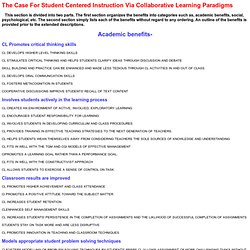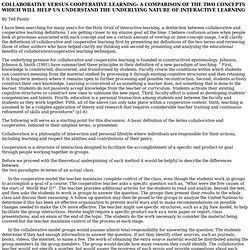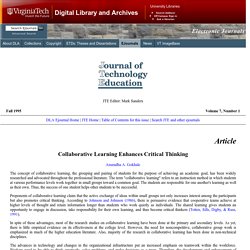

Defining Collaborative learning Dillenbourg-Pierre-1999. The benefits of Collaborative pedagogy Moore-Howard_Collaborative-Pedagogy. What is Collaborative Learning? Detailed 'summary' of teh benefits of Cooperative-Collaborative Learning. The Case For Student Centered Instruction Via Collaborative Learning Paradigms This section is divided into two parts.

The first section organizes the benefits into categories such as, academic benefits, social, psychological, etc. The second section simply lists each of the benefits without regard to any ordering. Coop/collab definition. By Ted Panitz I have been searching for many years for the Holy Grail of interactive learning, a distinction between collaborative and cooperative learning definitions.

I am getting closer to my elusive goal all the time. I believe confusion arises when people look at processes associated with each concept and see a certain amount of overlap or inter-concept usage. Collaborative Learning Enhances Critical Thinking. Anuradha A.

Gokhale The concept of collaborative learning, the grouping and pairing of students for the purpose of achieving an academic goal, has been widely researched and advocated throughout the professional literature. The term "collaborative learning" refers to an instruction method in which students at various performance levels work together in small groups toward a common goal. The students are responsible for one another's learning as well as their own. Nico Wiersema analysis of Collaborative learning. Collaborative Learning: comments archive.